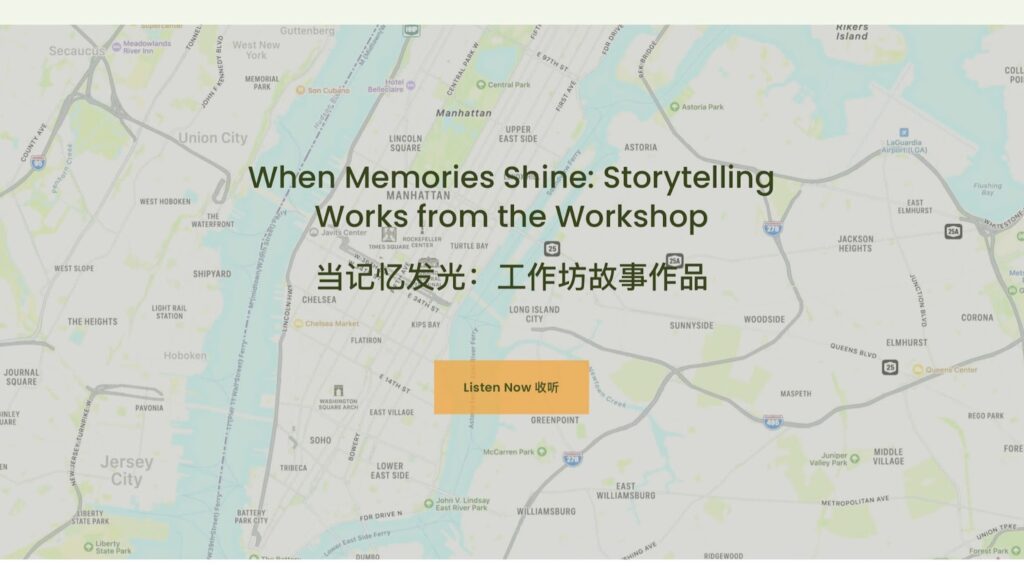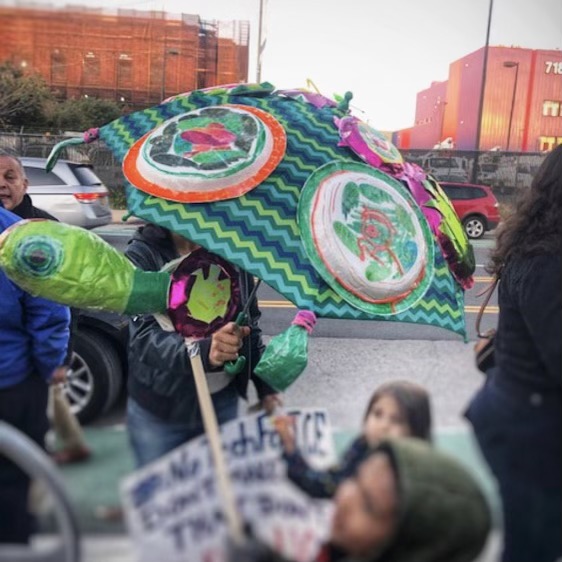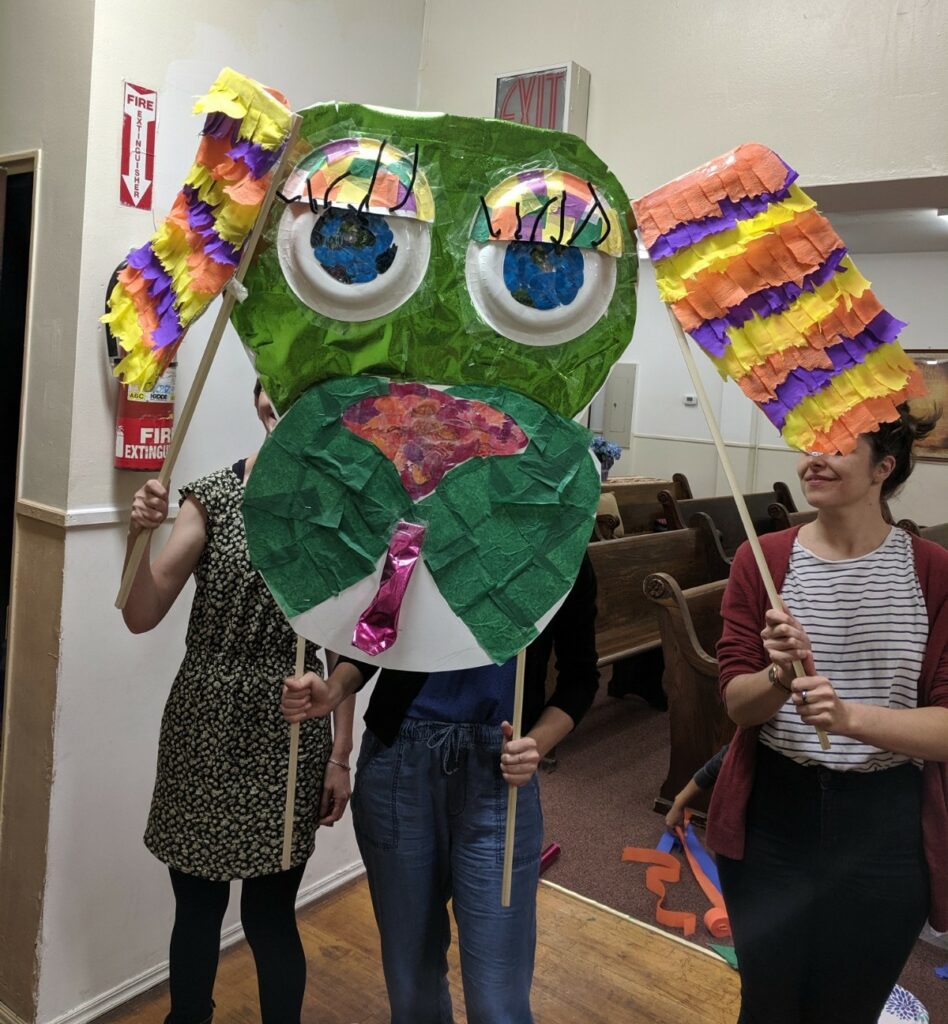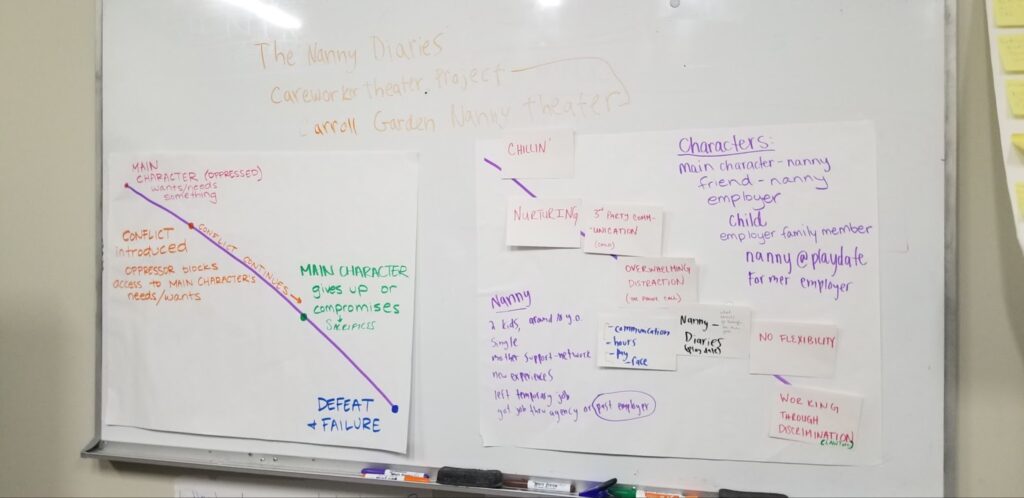Creative Conversations | A Space to Gather: Making Theater in Community
Leave a CommentCreate Change Fellows Jing Dong and Jessica Cortez are community-based theater artists who share an interest in performance as a space for imagination. For our Creative Conversations series, Jing and Jessica interviewed each other about their respective performance practices and work with communities, sharing about the unique ways theater can be used as a tool for connection, activism, education, and organizing.
This interview has been lightly edited.
Jing Dong: Jessica, what is a project you’ve worked on that you are proud of?
Jessica Cortez: One project I am very proud of is a virtual program I designed and facilitated through the San Diego Opera. In the midst of the pandemic, we wanted to create a space that invited young people to connect, reflect, and create art together. Over the past two years, my co-facilitator, Shayla James, and I have worked with a group of young women from various high schools in San Diego. Through storytelling, art making, theater, and music, we have been able to forge a strong community despite being from different neighborhoods. Together we have explored identity, mental health, body positivity, and gender expectations. The group is currently working on producing an original audio drama that will be coming out in June!
To me, theater is not a cultural product for people to consume, but a space where people gather and reflect on things. It is where things actually happen. And it can be a vehicle for change.
Jing Dong
Jing: I’d love to share a research-based project I did called Storytelling From Home, about the experiences of first generation immigrants living in the Lower East Side. As an immigrant myself, I know that to reroot in the US, many first-generation immigrants have left behind their cultures, traditions, languages, social connections, and memories. Because of language barriers and the time and energy needed for survival, their voices are often muted. I wanted to make a performance about this experience and amplify their voices. At first it felt like an impossible project to do because immigrants often have other priorities than art making. But together with collaborators and community members, following our plan that focused on process and community members’ needs, we built an ensemble step by step, and created a performance we all felt proud of. It was a multidisciplinary performance with storytelling, movement, music, and photography developed from experiences and performance ideas from the whole ensemble.

Website created by Jing for her storytelling workshop participants to exhibit their storytelling performances. Visit the site here.
Jessica: How do you collaborate with community members in art making?
Jing: As equal collaborators. In my earlier theater projects, our theater troupe used to share the production process openly with community members. They could choose to observe, participate, talk to us to find out what they wanted to do, and celebrate with us after shows. Some people ended up working with us for the production or even joining us. Now that I’m focusing on research-based projects, I invite community members to every phase, from research to devising and performing.
Jessica: In my practice, art making takes many forms and is usually based on the community’s interest. During my time as an applied theater practitioner, I have collaborated with communities on building parade puppets, crafting ofrendas, devising plays, engaging in interviews. Every art making endeavor is rooted in conversation.

Jing: What inspired you to focus on community-based theater?
Jessica: For me, theater has always been about community. I entered this field my third year in college as an Ethnic Studies major. My professor Evelyn Diaz Cruz was really the guiding light in my journey into community-based theater. She taught me that theater could be a way to channel my passion and my learnings from Ethnic Studies—that it could be a place for centering communities of color. Through her mentorship, I learned how theater has been used for community organizing, advocacy, and education. As I became more familiar with community-based forms such as Theatre of the Oppressed, Playback Theatre, ethnodrama, and guerrilla theatre, the more inspired I became to continue this practice of working within the community.

Jing: I love theater, but I don’t always get representational theater. To me, theater is not a cultural product for people to consume, but a space where people gather and reflect on things. It is where things actually happen. And it can be a vehicle for change. Community-based theater is this type of theater. It has so much potential for real art to take place, and it is accessible to a lot more people than many other types of theater.
Jessica: What are your thoughts on entering a community, cultivating ensemble, and exiting the community?
Jing: I think the most difficult part of working with communities is entering a community and building trust with people. It takes a curious mind, an open heart, patience, and a lot of time. And you still might fail. It is a great process for me to learn and get inspired by people I want to know, work with, and work for. For me, cultivating an ensemble happens simultaneously with art making, so skills and strategies from ensemble theater and pedagogy are helpful tools. In terms of exiting, I feel our current system does not value exiting as much as needed. I try to always build into my project plan a formal exiting gathering, to make space for people to celebrate our work together and reflect on our collective experience. It is a ritual for closure and a way of making meaning together, which I think is important for every one of us psychologically and spiritually.

Jessica: When entering a community, I think about what my connections are to the people I’ll be collaborating with. For example, when working with a group of domestic workers on a forum theatre project, I examined my own relationship to domestic work and care. I thought of my grandmothers, one of whom cleaned houses for many years of her life, and the other who worked as a nanny when she first came to the United States. Understanding these intersections are critical to unpacking why I intend to enter a community. Another aspect of entering a community is having a direct connection or invitation. When working on this project, one of my co-facilitators, who works as an organizer, had a connection to a neighborhood organization that hosted a local nanny association. This connection led to an invitation from the organizer there, which helped establish a level of trust between ourselves as facilitators and the domestic workers. In order to build community, I believe it takes a lot of deep listening, transparency, humility, food, and fun. Playing games is a huge part of cultivating an ensemble. It is through play that we make discoveries about ourselves and others.
Jessica Cortez (she/her) is a Chicana theatre artist from San Diego, CA currently living and creating in Brooklyn, NY. In 2020, Jessica graduated from the CUNY School of Professional Studies MA in Applied Theatre program where she was awarded the Graduate Apprenticeship for Diversity in Applied Theatre. Over the past six years, she has worked as a teaching artist with arts organizations including the Creative Arts Team, Ping Chong + Company, Girls Leadership, Teatro Izcalli, and the San Diego Opera. Jessica received her BA in both Ethnic Studies and Theatre Arts with a certification in Leadership/Nonprofit Management from the University of San Diego.
Jing Dong is a theatre maker focusing on creating research-based and community-based interdisciplinary performances. She believes that theatre is a space for people to gather, share, and imagine a collective future. Jing developed her artistry in ensemble settings by taking multiple roles. She has initiated projects on the Lower East Side that investigate into personal memories and social-historical context, and promote social justice and the well-being of community members. She was a 2019/20 AIR at University Settlement, and a LMCC Creative Engagement Grantee in 2020/21.